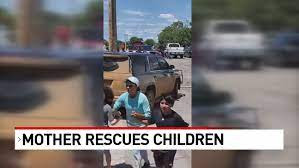Years ago, I was a practicing attorney in Alaska. Most of my clients were rural school districts that operated village schools in what Alaskans call the Bush: that vast region of Alaska that is off the road system. Most of these schools could only be reached by air.
One day I received a call from the principal of one of the village schools. "One of our students has a rifle," the principal informed me, "and he's holed up in the gymnasium and shooting into the village."
I asked the obvious question: "Have you called the troopers?"
Yes, the principal told me, the troopers had been alerted and were in the air. They would arrive in the village in about an hour.
Then I asked a second obvious question: "Why are you calling me?" After all, I was a civil attorney, and a shooting incident is a criminal matter.
The principal's reply astonished me. "Because the shooter is Special Ed."
Under federal law, all kids designated as Special Ed are entitled to an Individualized Education Plan (IEP), which cannot be changed without a due process hearing.
Apparently, the principal was concerned that arresting this kid or shooting him without giving him a hearing would violate his IEP.
I thought about this incident recently when I read about the massacre in Uvalde, Texas, where a young man killed 19 children and two teachers in an elementary-school classroom.
Several armed Uvalde police officers were in the school while the shooter was killing children, but they waited about an hour before storming the classroom and killing the shooter. Some wounded children bled out during the standoff--children who would have lived had they received prompt medical care.
Why did the police wait so long before confronting the shooter? Experts have opined on this question. Commentators have suggested that a communication breakdown explains the police officers' conduct or perhaps confusion about who was in charge. Some critics have charged the Uvalde police with cowardice.
I do not believe the officers hesitated out of fear. Texas lawmen are known for being physically courageous. The Uvalde officers probably knew the families of the kids being slaughtered. In fact, one Uvalde officer in the school during the shooting lost his child, and another officer's wife bled to death in her classroom. These officers weren't cowards.
I think there is another explanation for their inaction.
Americans now live in a society dominated by 24-hour news. News commentators and "talking head" experts seize on every catastrophe and breathlessly report as each tragedy unfolds. Almost instantly, the experts appear on our television screens to tell the world what the authorities did wrong and what they should have done.
Moreover, many shooting tragedies like the one in Uvalde wind up in protracted litigation, with lawyers grilling the people in charge and pointing out all the things that the people on the scene should have done.
All of us in this juiced-up world of hypermedia are getting a subliminal message that it is better to wait for instructions than react spontaneously to a tragedy like the one in Uvalde. We want a higher authority to tell us what to do. Then--if we get sued--we can say we were just following orders.
Finally, I wonder if police departments have become less effective by turning themselves into paramilitary forces. The little town of Uvalde had its own SWAT team, and many small police departments now have armored vehicles.
I think the Uvalde police may have dawdled while children were being killed because they were waiting for technical equipment and more highly trained rapid-response units.
In retrospect, I think everyone agrees that it would have been better for the Uvalde police to have immediately stormed that elementary-school classroom with pistols--even if one of the officers got killed in the assault.
Nevertheless, I have great sympathy for the Uvalde police officers who were waiting in a school hallway while children were dying--made impotent perhaps by a culture that trains all of us that it is better to wait for orders when faced with a crisis than to follow our natural instinct to act.


Randall Collins, the famed sociologist, has a series of illuminating blogs on school-gun violence, gun culture, parental oversight, and police violence, that I want to share.
ReplyDeletehttp://sociological-eye.blogspot.com/2012/09/clues-to-mass-rampage-killers-deep.html
http://sociological-eye.blogspot.com/2013/12/sandy-hook-school-shootings-lessons-for.html
http://sociological-eye.blogspot.com/2015/10/even-without-gun-control-warning-signs.html
http://sociological-eye.blogspot.com/2018/03/gun-cults.html
http://sociological-eye.blogspot.com/2020/06/seven-reasons-why-police-are-disliked.html
http://sociological-eye.blogspot.com/2016/10/cool-headed-cops-needed-heart-rate.html
http://sociological-eye.blogspot.com/2016/07/can-war-between-cops-and-blacks-be-de.html
For anyone interested, here is Collins’ take on Jan 6, Capitol Hill Assault from an historical/military perspective.
http://sociological-eye.blogspot.com/2021/01/assault-on-capitol-2021-1917-1792.html
Thanks for sending this. Richard
ReplyDelete